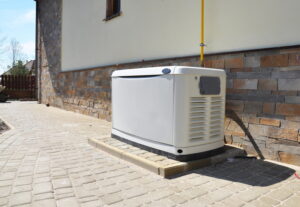
The recent streak of intense cold in parts of the country, combined with extended power outages, has brought up an important topic for homeowners: whole-house generators. Many people who never thought a generator would be important for their livelihood have started to consider installing a generator. After all, if Texas can experience massive power failures during a major cold snap, then parts of the country that have even colder winters—like us—are in danger of the same problem. A whole-house generator offers protection and peace of mind for emergency situations like this.
We offer generator services, including generator installation and generator repair in Annapolis, MD, and we’d like to share important information about this topic that’s now on everyone’s minds.
What About a Portable Generator?
If you’re considering getting a generator, you might think it’s a better, less expensive idea to purchase a portable generator. These smaller generators have great uses—mostly for camping and travel. They aren’t effective at handling the needs of an entire home, especially for a power outage that lasts more than a few hours. Portable generators can pose safety risks because they must be connected to the home’s electrical system from inside, where they create toxic exhaust fumes.
The Whole-House Standby Generator
The type of generator that best serves a home in case of an extended loss of power is a whole-house standby generator. This is a permanent installation that’s placed outside the house and hardwired into the electrical system. The generator runs off a separate fuel source: the most common is natural gas, which has the benefit of not running out because it’s piped directly to the house. For houses without access to a natural gas line, liquid propane is the main fuel alternative.
If a whole-house standby generator is correctly sized and professionally installed, it can handle the important electrical needs of the household for days. If you choose to have one of these generators installed, you’ll work with our professionals to determine how much power you’ll require during a blackout. You may only want enough to run vital appliances (heating systems, refrigerators, powered medical equipment) and the lights. You may also opt to power the entire house.
The Automatic Standby Generator
With a standard whole-house generator, you must go outside to manually start the generator in case of a power outage. An automatic standby generator detects a loss of power to the house and turns itself on. This is more convenient, safer, and ensures the power will come on even if you aren’t home at the time.
Regular Generator Services
For a generator to be any good, it must be trustworthy. You won’t use a generator most years if you’re lucky, but you’ll want to be confident that it will work when you need it to. To help ensure reliability, schedule regular maintenance services for the generator and call for repairs as soon as you think anything is wrong with the system. We can handle all these jobs.
B&B Air Conditioning & Heating Service: We are always there when you need us! Call us to arrange for generator services.


